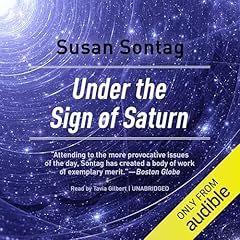
Against Interpretation and Other Essays
No se pudo agregar al carrito
Add to Cart failed.
Error al Agregar a Lista de Deseos.
Error al eliminar de la lista de deseos.
Error al añadir a tu biblioteca
Error al seguir el podcast
Error al dejar de seguir el podcast
Obtén 3 meses por US$0.99 al mes
 Exclusivo para miembros Prime: ¿Nuevo en Audible? Obtén 2 audiolibros gratis con tu prueba.
Exclusivo para miembros Prime: ¿Nuevo en Audible? Obtén 2 audiolibros gratis con tu prueba.
Compra ahora por $21.94
-
Narrado por:
-
Tavia Gilbert
-
De:
-
Susan Sontag
Against Interpretation was Susan Sontag's first collection of essays and is a modern classic.
Originally published in 1966, it has never gone out of print and has influenced generations of readers all over the world.
It includes the famous essays "Notes on Camp" and "Against Interpretation," as well as, her impassioned discussions of Sartre, Camus, Simone Weil, Godard, Beckett, Levi-Strauss, science-fiction movies, psychoanalysis, and contemporary religious thought.
©2018 Blackstone Audio, Inc. (P)2018 Blackstone Audio, Inc.Los oyentes también disfrutaron:




















Las personas que vieron esto también vieron:


















I felt like I was at a literary conference. And since she admits she even doesn’t agree with everything she wrote, and these essays are now 60 years old, the only way you should encounter this book is in text form if you are in a literary criticism class writing a paper summarizing criticism of criticism.
Also… the manner in which these essays are read does not emphasize the form: essay. It’s almost jarring to hear the narrator pronounce French authors or Italian authors as if she has no accent at all.
We all know Sontag is revered, and deservedly so, but as someone now retired, revisiting old haunts or selections I might have missed over the years, I was dissatisfied.
The manner in which these essays are read does not truly emphasize the form: essays.
Se ha producido un error. Vuelve a intentarlo dentro de unos minutos.
Unify the logos, ethos, and pathos of art as a reflection of the human experience, so as to advocate for a modern theory of aesthetic appreciation. The conclusions Sontag draws inform everything from how artists should approach outlines of works not-yet-started to the value governments and corporations place on ouevres.
The voice talent / reading itself leaves a little to be desired but it's still overall good.
Synesthesia at Its Most Structured
Se ha producido un error. Vuelve a intentarlo dentro de unos minutos.
Against interpretation, like, literally.
Se ha producido un error. Vuelve a intentarlo dentro de unos minutos.
I've listened to Jennifer Van Dyck's reading on Sontag's journals and "On Photography". Audible PLEASE HAVE THESE RE-RECORDED with Jennifer Van Dyck.
Excellent Essays Hurt By Labored Narrator
Se ha producido un error. Vuelve a intentarlo dentro de unos minutos.
Distracting Reader serious writing
Se ha producido un error. Vuelve a intentarlo dentro de unos minutos.


